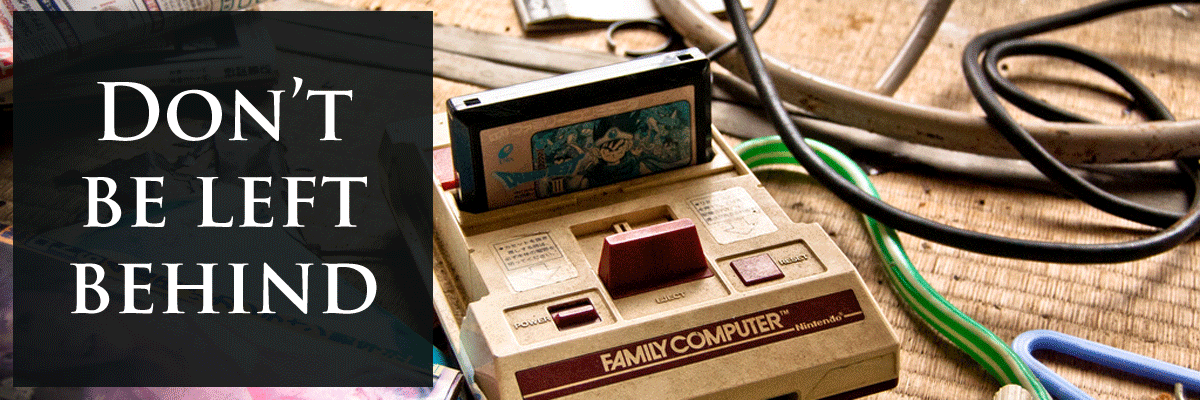Oh, Canada! This for a developed country with one of the highest rates of high-speed (read: useful) internet penetration in the world2. Now, I feel safe in presuming that Canadians behave more or less like other homo sapiens, and that the relationship between businesses and technology is at least fairly similar in the rest of the developed world. So - technological constraints aside - what's stopping small business from getting on the e-commerce gravy train?
Maybe they can't be bothered, or just can't see the point. If that's the case, they're either making a serious error, or are blind to the facts.
Let's help them see, shall we? In that same year (2007), Canadian retail sales totaled C$413.1 billion3. Online sales only represented a 'paltry' 3.1% of the total4. And that's practically nothing, right?
Well, not really, unless you consider C$12.8 billion to be nothing. Put another way, those same online sales come out to around $C4740 for each and every one of the 2.7 million workers those same small businesses employed5, or $C1200 for each of the 10.6 million employees of Canada's private sector workforce. And neither of those figures seem particularly insignificant, either. So why is it that small business is so reluctant to embrace e-commerce? It certainly isn't that there's no money to be made, nor that they don't have salaries to pay.
To be fair, a lot of small businesses may well be poorly adapted to adopting e-commerce as a sales and distribution method, as it's likely most use this as their reason for ignoring it. A company selling small quantities of perishable products (like a bakery), where neither the average spend nor delivery delays are adapted to online trading, could reasonably argue along these lines that e-commerce just isn't for them. But an awful lot of other businesses try – and fail – to advance this arguement successfully to justify the absence of an e-commerce strategy. In doing so, they ignore (at their peril) the fact that e-commerce can – and should – be a part of their way of doing business with their customers. And even more seem oblivious to the fact that building an online presence via a business website (at the very least) is a vital part of developing a successful business in the 21st century.
If you don't believe me, allow me to introduce you to my constant companion, the iPhone. In the less-than-3-years of its existence, it and it's clones have lead to an explosion of smart phone sales. Thanks to cheap mobile data contracts, people can now stay connected online both indoors and out, 24/7. Finding that local Chinese restaurant, or green grocer's, is as easy as opening AroundMe – and far less 'threatening' than having to converse with strangers in the street. If your business doesn't at least have a website – even a one-page wonder with nothing more than your address and phone number – you'll just miss out on that sale. And if you think the charm of your 'mom 'n' pop' electrical goods or handicrafts storefront, and your loyal customer base, is enough to keep your business afloat, think again. A lot of time-poor  commuters would much rather spend 5 minutes buying their TV or vacuum cleaner online than waste a couple of hours traveling from suburb to town and back on a Saturday to do the same thing. No matter how charming they think your store may be, or how nice you are, or how long they've been doing business with you.
commuters would much rather spend 5 minutes buying their TV or vacuum cleaner online than waste a couple of hours traveling from suburb to town and back on a Saturday to do the same thing. No matter how charming they think your store may be, or how nice you are, or how long they've been doing business with you.
All of which leaves me perplexed: why, in 2010, are there still any businesses that don't have some form of online presence? How is it possible, given their access to easy-to-use, free website builder tools, enabling them to make a website faster that you can blink an eye (well, almost)? And when will those small businesses that have a website get around to integrating an online store, and give their customers a chance to shop they way they might actually want to?
Given it's not a question of cost (it's free), or technical expertise (it's easy), it does seem that many are missing the point. If that's the case, let's just hope the numbers start to register for them soon: frankly, C$12 billion seems too good an incentive to ignore for long. Or maybe they really just can't be bothered – after all, what's a few billion in lost sales between friends…?
1 Statistics Canada, How many small businesses use e-business? 2009.
2 OECD, OECD Broadband Portal (various data series), 2009.
3 Statistics Canada, Retailers Competing for Market Share: 2007 Retail Sales in Review, 2008.
4 Statistics Canada, Survey of Electronic Commerce and Technology (SECT), 2008.
5 Statistics Canada, Key Small Business Statistics - July 2007, 2007.

 commuters would much rather spend 5 minutes buying their TV or vacuum cleaner online than waste a couple of hours traveling from suburb to town and back on a Saturday to do the same thing. No matter how charming they think your store may be, or how nice you are, or how long they've been doing business with you.
commuters would much rather spend 5 minutes buying their TV or vacuum cleaner online than waste a couple of hours traveling from suburb to town and back on a Saturday to do the same thing. No matter how charming they think your store may be, or how nice you are, or how long they've been doing business with you.